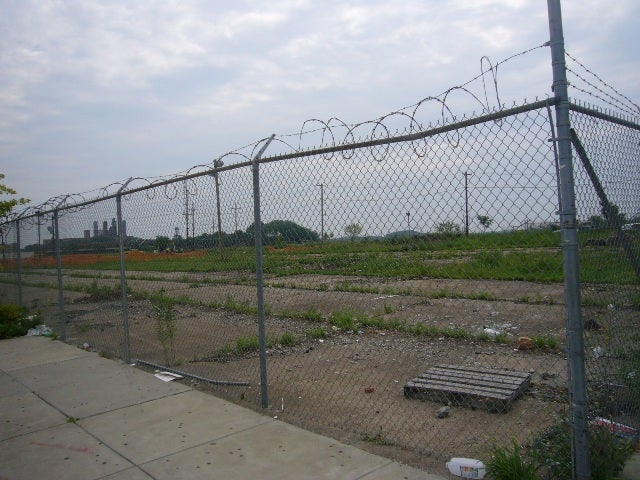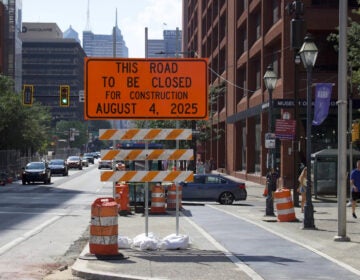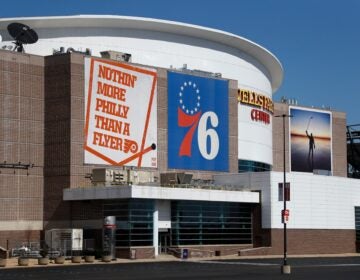Breaking news: Thumbs down to Foxwoods extension request

Dec. 16
By Kellie Patrick Gates
For PlanPhilly
The enforcement arm of the Pennsylvania Gaming Control Board says Foxwoods Casino’s request for more time to produce detailed drawings of its proposed project should be denied.
In fact, Philadelphia Entertainment and Development Partners’ failure to file these drawings on time means they are in violation of the board’s September order that granted them an extra two years to get slots up and running, Chief Enforcement Counsel Cyrus R. Pitre wrote in a document filed with the board yesterday. And that failure “authorizes the board to fine, and/or sanction Foxwoods, or if it deems appropriate revoke the slot machine license,” he said.
“We have the highest regard for the office of enforcement counsel, and they are entitled to their opinion, but we respectfully disagree,” said Foxwoods attorney Fred Jacoby. Jacoby said Foxwoods would be filing a response, and he is also confident Foxwoods will prove its need for an extension at the hearing, which he expects to be held next month.
The Gaming Control Board demanded that the casino provide such drawings, engineering reports and similar documents by Dec. 1. At the end of November, Philadelphia Entertainment and Development Partners instead asked the board if they could turn in that information in March, when the details of their financing are due.
In their motion to extend, Foxwoods’ attorneys argued that drawings were dependent on the sources and types of funding they received, and also on whether the state legislature approved table games.
In a response to the extension request filed Tuesday, Pitre wrote that Foxwoods should be able to produce drawings without having the funding nailed down, especially since the Board told the casino it wants the facility to be “substantially similar to that approved by the board on Dec. 20, 2006.”
Pitre also said that table games status should not have prevented Foxwoods from meeting its deadline. Foxwoods’ original plan, which was approved by the board, called for either additional slots and/or table games in its second phase, and further amenities in a third phase, he wrote. Based on those plans, and when there was no proposed table games legislation in existence, Foxwoods was able to get funding for the first phase, Pitre wrote. (That funding fell through during the 2008 economic collapse.) “There is no reason to believe Foxwoods could not do the same now.”
Jacoby said that the stated reasons for an extension remain valid. Foxwoods is near a funding agreement, he said, but the potential investor wants to know what’s happening with table games.
“We are very close with one major investors. But as any businessman would, they want to have a sense of what the future holds for gaming, including table games, tax rates, etcetera,” he said.
This has a direct impact on the casino’s ability to produce designs, he said, because that key investor “has a large capacity to develop the design in-house,” Jacoby said. The investor would either literally create the design or would hire a consultant to do it, he said.
Either way, they would have an “instrumental” role in the design.
Jacoby said he hopes the state passes table games legislation soon. It was approved by the House last night and the Senate is considering it, and may make amendments, today. The House has delayed going on break to be around for a final vote.
But Jacoby said even if the bill passes in coming days, Foxwoods will still need until March 1 to turn in its designs, considering that it’s nearly the end of December.
The table games legislation also contains a provision that could add another wrinkle to Foxwoods’ situation. Current gaming law says that casino developers can receive no longer than a two-year extension to get slots up and running. But the same bill that would legalize table games– SB711 – would allow the Gaming Control Board to give additional time.
Jacoby said he wasn’t certain that Foxwoods would apply for an extension beyond May 2011 if the legislation passes, but “I would expect that they would.”
Only if such a request were granted is there any possibility of Foxwoods opening with the Phase I of their project as originally planned, he said. Otherwise, he said, Foxwoods will need to open with either an interim or temporary facility. An interim facility would eventually be incorporated into the finished project, he said. This is the approach SugarHouse is taking.
A temporary facility would be eventually removed or torn down. In some places, hardy tents have been used for this purpose. Jacoby said he had no idea what his client might propose. Foxwoods has told the Gaming Control Board that they could be asking for permission to build a temporary casino, but has not yet made a formal request.
While Pitre said the Gaming Control Board has reason to revoke Foxwoods’ license, a group of state legislators from Philadelphia has petitioned the Gaming Control Board to do so. The legislators say the casino has had enough time and has not made enough progress toward opening.
If the board were to rescind the license, it would be required to open up a public process to re-issue that right to someone else for Philadelphia’s second casino. SugarHouse Casino has begun construction on an interim facility in Fishtown.
But Jacoby said Foxwoods should keep its license, as it has “been proceeding in good faith” and would likely be up by now if not for a long series of extraordinary circumstances, including a slew of battles with the city in State Supreme Court and time spent considering alternate sites for the casino at the request of Mayor Michael Nutter and Gov. Ed Rendell.
The city doesn’t like Foxwoods’ Delaware Avenue site. But they were very pleased when Foxwoods announced its intention to build at the former Strawbridge building. But they ran into complications with another building tenant and had never formally requested a license transfer when the Gaming Control Board issued its license extension, but made it clear they wanted the casino to be built at its original South Philadelphia location.
On top of all of that was the economic collapse, Jacoby said.
SugarHouse faced many of the same obstacles, although they never considered an alternative location. “A great deal of time was spent looking at two alternative sites,” Jacoby said. He said he’s familiar with SugarHouse’s situation, and they have had “different resources, and different personnel. It’s not necessarily fair to compare one with the other.”
The Gaming Control Board has meetings scheduled for Jan. 8 and 27, and, with a few days notice, could hold a hearing on the extension request at either meeting, said PGCB spokesman Richard McGarvey.
Contact the reporter at kelliespatrick@gmail.com
WHYY is your source for fact-based, in-depth journalism and information. As a nonprofit organization, we rely on financial support from readers like you. Please give today.





